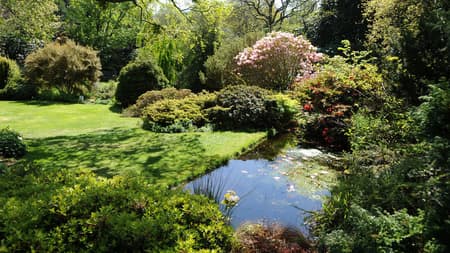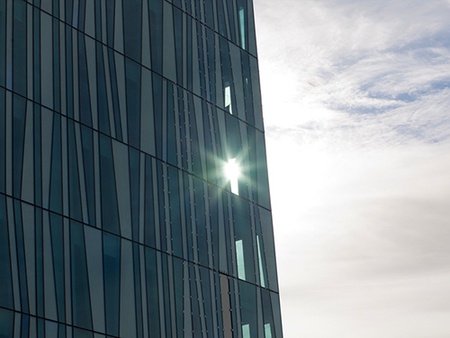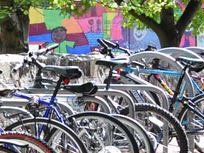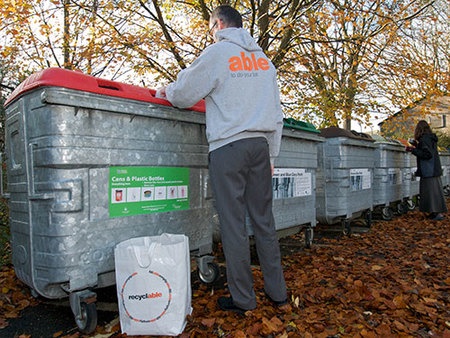 |
- Biodiversity
-

Our campus is home to a range of plant and animal species and hosts an array of student, academic and community initiatives that seek to promote and preserve biodiversity.
From bat and bird boxes to schools engagement activity; from student growing projects to community links through the Friends of Cruickshank Gardens, there are a range of initiatives to support biodiversity.
Please see also the Biodiversity section of our Environmental Sustainability Policy.
- Buildings
-

Sustainable Buildings
The Sustainable Buildings section of the Environmental Sustainability Policy sets out the University's commitments to sustainability in the context of campus development, whether it be refurbishment or new build.
These commitment were initially exemplified in our Sir Duncan Rice Library and the Suttie Centre both of which secured BREEAM 'Excellent' ratings and were recognised nationally. Our projects have reinforced these commitments by embedding technologies such as micro-renewables (e.g. solar panels on our SDRL and on residential blocks at Hillhead) and other sustainability initiatives such as rainwater harvesting (e.g. our SDRL and Rocking Horse Nursery).
Most notably these include the completion of our Green Gown award winning Passivhaus 'Rocking Horse Nursery' (our on-campus pre-school childcare facility for staff and students). Meanwhile, our new Rowett Institute of Nutrition and Health building is on target to secure an 'Outstanding' in the BREEAM methodology and was shortlisted for a 2015 BREEAM award.
Links to articles on these projects can be found below:
- Suttie Centre (Teaching and Learning in Healthcare)
- Sir Duncan Rice Library
- Rocking Horse Nursery
- Rowett Institute of Nutrition and Health
Further information on the work of the Estates Projects team can be found here.
- Carbon
-
As part of our Aberdeen 2040 strategy, the University has committed to being net-zero before 2040, with an interim target of a 25% reduction of Scope 1 & 2 related emissions by 2025 articulated in the accompanying implementation plan. We are in the process of developing a programme of projects linked to heating and energy use to deliver on that ambition, with further interim targets to be set, including for Scope 3 emissions.
Prior to the net-zero commitment made in Aberdeen 2040, our previous Carbon Management Plan (CMP) had outlined the commitments and projects we had identified to reduce our carbon footprint. Details of that 2016-2021 CMP can be found here. It identified an array of projects to improve energy efficiency across campus and progress against the plan was positive, with reductions exceeding the 20% target within the first two years.
As with much of the sector, the simultaneous expansion of campuses, coupled with demands for energy intensive equipment are a constant challenge. Despite these challenges, incremental improvements have helped to keep emissions in check and improve energy efficiency. These include:
- the campus wide installation of PC energy management software;
- the installation of solar panels at Hillhead, our main student residence;
- the completion of an impressively energy-efficient shared data centre that serves all of the region's tertiary education providers;
- widespread window replacement, insulation programmes, and proximity sensors on lights;
- the gradual replacement of less energy efficient bulbs with LEDs;
- the completion of our award-winning Passivhaus Nursery building;
- recalibration of our Combined Heat and Power engine resulting in significant energy savings.
Yet for every successful initiative, demands for new equipment or new or refurbished buildings mean the work to embed energy efficiency in all that we do continues.
- Climate and Sustainability Assemblies
-
One of the ways the University is using to engage our staff and students is through the use of Climate and Sustainability Assemblies. Globally, nationally and locally, there is a growing movement to include communities in policy making through assemblies that discuss issues such as climate change. This participatory approach actively involves people and communities in decision making and generates new ideas for action on sustainability.
The University aims to run one or two assemblies each academic year on different topics related to sustainability. These forums will gather staff and student feedback that will in turn shape policy and action in support of a greener, more sustainable future for the University.
Biodiversity
Our first assembly focussed on Becoming a Nature-Positive University and was held on 15th March 2023. It explored how we can make our campus a greener, more inviting place for people and nature. The outputs of the assembly have been considered by the Sustainable Development Committee and will now be used to inform the development of a new biodiversity policy and biodiversity action plan.
The report of that first assembly can be found here.
Laboratories
Our second assembly focussed on the issue of Sustainable Laboratories and took place on 4 October 2023. We heard from two inspiring visiting speakers before colleagues from lab-based disciplines across the University workshopped issues including procurement, LEAF accreditation, single-use plastics, equipment sharing, and improved recycling.
The report of the Green Labs assembly can be found here.
Future Events
Further topics are being considered and the next Assembly should take place in the autumn of 2024.
- Energy
-
We are working to reduce our energy consumption and to improve energy efficiency, helping reduce CO2 emissions and operational costs.
Energy Use and Energy Efficiency
The University's electricity and gas consumption is equivalent to that of a small town. It is, therefore, essential that we seek to improve our energy efficiency, use energy from renewable sources where possible, and reduce our emissions from energy use.
Energy related queries can be directed to our Energy Manager or phone 01224 273266.
Campus Initiatives Our Old Aberdeen campus is served by a gas-fired Combined Heat and Power (CHP) plant, opened in 2007. This facility generates the majority of the electricity consumed by our Old Aberdeen operations (supplemented by grid electricity) and diverts the by-product of that process (steam) to heat the campus. The grid electricity we purchase for all our main academic sites is backed by Renewable Energy Guarantee of Origin certifications, exceptions are our student residences and a handful of remote or independently supplied sites.
As part of a major refurbishment of our main student residence (Hillhead), we have installed an extensive solar panel array. We are, as part of our net-zero deliberations, actively investigating options for the eventual decarbonisation of our campuses, with the aim of eventually moving away from gas-fired systems. We also work to ensure that all new buildings conform to high energy efficiency standards.
In addition to major infrastructure projects, the University has invested in a number of energy efficiency (and emissions reduction) measures. Some examples of such initiatives are:
- Tackling CHP inefficiencies. Case Study: CHP Variable Speed Drives
- Improving insulation and lagging. Case Study: Plant Room Pipes
- Installing automatic lighting control in areas where appropriate.
- IT energy efficiencies e.g. PC power management. Case Study: Replacing MFDs
- Extensive glazing replacement programmes to improve building efficiency.
- Replacing less efficient light bulbs with LEDs. Case Study: James Mackay Hall
- Managing heating demand and analysing occupancy. Case Study: Chaplaincy
Our Sustainability Team also works with staff and students to raise awareness of energy related issues - with stalls at staff and student fayres (e.g. during Fresher's Week), awareness sessions, public talks, and contributions to undergraduate and postgraduate teaching programmes.
The team's considerable impact in reducing the institutional carbon footprint as part of our 2016/2021 Carbon Management Plan was recognised with a number of notable successes in the Energy Managers Associaton awards in both 2017 and 2018.
Reporting Details of our Energy performance in recent years is available in the following documents:
Energy Reports (including Carbon and Water)
Utilities Reports
Individual Measures Details of the measures individuals can take to reduce energy use include:
- Using multi-functional devices for day-to-day printing needs;
- Buying only the most energy efficient equipment for your lab or office;
- Ensuring all equipment (PCs, printers, plasma screens etc.) are switched off overnight or hibernated when not in use.
- Procurement
-
We support the sector-wide commitment to sustainable procurement.
The University's Procurement Team is based in the Directorate of Finance and we can be contacted at procurement@abdn.ac.uk or visit our webpage.
The team oversees purchasing activity and manages contracts used across the University for items from paper to vehicles. They also provide a full range of central tendering services and ensure that procurement remains compliant with our own regulations and national legislation.
We recognise the growing role of procurement as a driver of sustainability performance and are investigating ways to work internally and across the sector to ensure procurement activity supports sustainability objectives.
We are delighted to have been part of the Advanced Procurement for Universities and Colleges (APUC) working group on Sustainable Procurement that has introduced a Supply Chain Policy and Code of Conduct.
Procurement Emissions Summary
We welcome the work of APUC in providing all universities in Scotland with an estimate of their greenhouse gas emissions from procurement activity. These reports were first produced for the sector in 2012/13 and they provide a high-level estimate of the greenhouse gas emissions from the sector's wider procurement of goods and services. Emissions derived from those aspects of activity generally included in institutional climate change and carbon reporting returns are excluded e.g. energy, waste and transport.
The principal findings of that exercise are included below:
- 2019/20 [39,831 tCO2e] - follows a major review of the calculation methodology by APUC
- 2018/19 [22,983 tC02e] - 41,885 tCO2e with 2019/20 methodology applied
- 2017/18 [23,301 tC02e] - 38,997 tCO2e with 2019/20 methodology applied
- 2016/17 [31,023 tC02e]
- 2015/16 [34,168 tC02e]
- 2014/15 [34,092 tC02e]
- 2013/14 [35,438 tC02e]
- 2012/13 [30,023 tC02e]
Modern Slavery Statement
The University's Slavery & Human Trafficking Statement is made pursuant to Section 54 of the Modern slavery Act 2015.
It is designed to demonstrate our commitment to the Modern Slavery Act 2015, (and specifically to section 54 (1)), and the Human Trafficking and Exploitation (Scotland) Act 2015 by informing our students, staff, partners and the public about the University of Aberdeen and its policy with respect to modern slavery, human trafficking, forced and bonded labour and labour rights violations in its supply chains.
Electronics Watch
The University of Aberdeen Procurement Team worked with the AUSA and became a founding member of Electronics Watch in 2015, an independent organisation that works to ensure good working conditions in factories providing goods bought by public sector members. We regularly provide reports to them of ICT equipment we buy and where they are produced. Electronics Watch works with civil society organisations in the countries where the factories are located to monitor working conditions.
In early 2017 following a proposal from the University of Aberdeen, the Procurement Strategy Group for Scottish Universities and the Procurement Strategy Group for Scottish Colleges, unanimously agreed to add their collective weight to a call for all institutions to obtain membership of Electronics Watch via a collective arrangement organised and managed by APUC (Advanced Procurement for Universities and Colleges), their Centre of Procurement Expertise.
It is understood that Scotland is the first country in the World where all the Universities and Colleges in a country (or indeed all organisations within an entire sector of any type) will be members of Electronics Watch.
- Sustainability - E-Learning Module
-
The Sustainability team in Estates & Facilities has developed an e-learning module that is designed to give all staff (and in a future edition, students) an overview of sustainability issues, their national and international context, why the University must take them seriously, and some ideas for how to embed sustainability in your day-to-day roles.
The module contains information on the local and global context of climate change, our institutional emissions profile, and commentary on key sustainability challenges in areas like procurement, travel and energy, as well as more besides.
The aim is to include the module as part of the induction programme for new staff, but we'd encourage ALL staff to work through the module as there's something for everyone there. We'd also welcome feedback by way of beta testing to ensure it is being pitched at the right level. Scores in the knowledge checks aren't being tracked at this stage as its intended as an awareness raising tool rather than as a 'test'. The module takes 45-60 minutes to work through.
The module can be found on the University's training pages here Sustainability E-Learning Module and any feedback you have can be sent to sustainability@abdn.ac.uk.
- Sustainable IT
-
Through collaborative initiatives and the pursuit of technological efficiency we work to ensure our IT systems support sustainability goals.
The use of ever more energy efficient technology and the need to consider sustainability in all IT procurement decisions have been established as priorities under a commitment to "Deliver Greener IT", one of the six strategic aims of the IT Services Strategic Plan 2012-2016.
Data Centre Project The first in a series of collaborative data centre projects between the University of Aberdeen, Robert Gordon University, and North East Scotland College opened in 2013. Given the substantial financial and carbon savings such collaborative projects can deliver for the sector, further projects are being developed with educational and other partners.
Details of the Edward Wright Building data centre, which scooped several national awards, including a sector Green Gown Award, a British Computing Society UK IT Industry Award, and a Scottish Green Energy Award are available below. Read more
Other Projects In recent years the University has introduced a number of technology initiatives to improve energy efficiency and reduce waste. These include:
- remote power management on campus PCs
- print migration to multi-function devices
- rationalisation and virtualisation of server provision
Further virtualisation, greater use of shared data centres and the consolidation of print services across the campus will continue to drive down energy use, support the delivery of carbon targets and reduce costs.
- Transport & Travel Planning
-

Transport and Travel Planning
As one of the largest employers in the North-East of Scotland, and with a sizable student population, the University recognises that it has a significant impact on the region's transport network through both the conduct of its activities and commuting associated with study and work.
Transport related queries can be directed to our Facilities Manager (Transport & Waste) or phone 01224 272254.
Travel Plan The development of a sustainable travel plan is a significant element in the fulfilment of our institution wide commitment to sustainability and social responsibility. It is also a central requirement of planning conditions set by local and national government as part of new capital projects.
Our Sustainable Travel Plan aims to:
- reduce the number of single occupancy cars travelling to the University;
- ensure the best utilisation of University car parking resources;
- continually improve and promote the range of low carbon transport options available to staff, students and visitors for travel to the University, and between University sites;
- reduce the environmental impact of travel associated with University operations.
The full plan is available via the University's Policy Zone.
Initiatives in support of the Travel Plan include extensive cycle infrastructure (see below) and free inter-campus travel for our staff and students on the 9U shuttle bus.
Our campus also has a number of traffic calming measures such as speedhumps and pedestrian-priority zebra crossings to improve safety. During campus events e.g. University Open Days and Graduations, the main campus transit roads are closed to public traffic, with only designated and emergency vehicles able to access the site. The High Street, the main public road on campus, has restricted access e.g. for residents and emergency vehicles only.
Reporting The University conducts biennial surveys of staff and students to gauge travel behaviours and assess progress towards the goals outlined in the plan.
Travel Survey Reports detailing the outcomes of those surveys are available below:
Travel Options Among the initiatives we use to encourage sustainable travel behaviours at the University are:
- Cycle parking places for over 500 bikes in Old Aberdeen and 100 at Foresterhill (see locations);
- Secure cycle storage facilities on campus and at Hillhead;
- Support for a free car-sharing scheme (full details and registration);
- Provision of a free inter-campus shuttle-bus service (the 9U) for staff and students.
The University also supports an occasional cycle-to-work scheme for staff. Details are widely circulated when this scheme is in operation.
The campus also hosts BeCycle, a local community bicycle workshop.
The University is also well served by a range of public transport options and we encourage staff and students to use these wherever possible.
Bus services are provided by First Group and Stagecoach Bluebird. Commuter rail services link Aberdeen with Portlethen, Stonehaven, Laurencekirk, Inverurie and Huntly. Inter-city services provide connectivity to stations across the UK.
It is also possible to walk between our campuses, student residences and the city centre. While walking times vary by individual, our two main campuses are around 35-40 minutes apart by foot.
- Waste
-

Waste Management
As part of our effort to make efficient use of resources, we aim to embed waste management into corporate policies and processes and to adopt the principles of the waste hierarchy - REDUCE, REUSE, RECYCLE.
Our aims are to reduce the volume of waste generated in the first place and the volume sent to landfill, while improving reuse and recycling rates.
Waste related queries can be directed to our Facilities Manager - Transport & Waste or phone 01224 272254.
Waste Initiatives The environmental benefits of diverting material from landfill are clear, but there are also legislative and financial drivers that encourage us to reduce waste at source while improving our recycling and reuse rates.
Scotland's Zero Waste Plan sets out the Scottish Government's vision for a zero waste society. It sees all waste as a resource and aims to ensure that waste is minimised; valuable resources are not disposed of in landfill; most waste is sorted; and only limited amounts of waste are left to be treated.
In recent years the University has used a range of innovative ways of diverting waste from landfill. These have included:
- WEEE amnesty events, where students, staff and the public have been encouraged to donate damaged electrical items for recycling (in partnership with the local authority);
- annual student accommodation clearance schemes where local charities benefit from items left behind at the end of term;
- charitable partnership with Re-Using IT to divert ex-use IT equipment for re-use in African schools and in social enterprise projects locally.
Reporting Our headline waste arising data is recorded year-on-year and fully itemised by category in relation to its emissions impact as part of our annual Public Bodies Climate Change Duties reports.
Headline waste arising data under 4 categories i.e. Reuse (Internal or External), Recycled, Energy from Waste, Disposal (Landfill) and is shown on the table below in metric tonnes.
Reuse
Recycled
Energy from Waste
Disposal (Landfill)
Total
2024/25
Nil
457.216
200.599
Nil
657.815
2023/24
Nil
528.454
284.156
Nil
812.610
2022/23
7.979
606.454
314.221
3.640
932.294
2021/22
1.751
573.694
265.178
17.800
858.423
2020/21
3.074
483.362
211.970
6.280
704.686
2019/20
0.200
593.973
313.744
7.320
915.237
2018/19
1.668
734.710
355.582
12.358
1104.317
2017/18
7.432
953.872
499.592
0.500
1461.396
Historic annual Waste Reports are available as follows.
Staff and Student Advice Staff and students at the University can assist in these efforts by considering how the waste they generate will be disposed of and by helping to minimise waste wherever possible.
The University has extensive recycling facilities around campus, and has contracts in place to recycle a wide variety of materials. Secure paper disposal and recycling consoles are distributed across campus.
Detailed guidance is available to staff colleagues (via the Estates section's operational pages at the link below) on all aspects of waste disposal. Examples of the activities you'll find guidance on include:
- clearing an office (e.g. large volumes of paper or books);
- looking for a new home for used office furniture;
- disposing of chemical or clinical wastes;
- trying to recycle or reuse used or damaged electrical equipment.
For more information visit the Waste and Recycling page
- Water
-
The University recognises that water is a valuable resource. Managing and reducing water consumption is part of a rounded approach to resource efficiency. The University is committed to reducing water usage in order to secure both environmental benefits and to minimise the impact of water usage costs.
Reporting: We actively monitor the volume of water we use, compiling metered consumption data annually and publishing our water usage as part of our Public Bodies Climate Change Duty reporting.
Targets: We aim to reduce water usage and improve water efficiency. Our Environmental Sustainability Policy outlines a target to reduce water use year-on-year.
Drinking Water: We have installed plumbed in water supplies at facilities across campus, providing free drinking water for staff, student and visitor use.
Regulation: Our use of water is covered under the regulations and byelaws imposed by the Scottish Environment Protection Agency (SEPA) and Scottish Water.
Local and National Infrastructure Through its use of water in taps, toilets, research, catering and residences, the University is classified as a 'large' water user by Scottish Water.
In recent years the University has introduced a number of initiatives and water saving technologies. These have included:
- installing push head or sensor controlled taps in toilet areas;
- improved flush control in urinals to reduce water consumption outside operating hours;
- introducing low volume cisterns as standard;
- improved water metering and leak identification.
The University has been active in replacing bottled water coolers with plumbed in water fountains to provide free drinking water for staff, students and visitors - these appear in, for example, our Sir Duncan Rice Library, MacRobert cafe, Student Union Building, and University Office staff kitchens to name but a few.
While this notionally increases mains water consumption, it avoids an array of environmental issues associated with the transportation, disposal and use of bottled water supplies and associated single-use (mostly plastic) containers. It also ensures that free drinking water is available campus-wide.
Regulations
Our use of water is overseen by the Scottish Environment Protection Agency (SEPA) who are responsible for the water regulations that ensure users abide by environmental and other protections, including discharges, abstraction, and pollution control.
Waste Water Treatment
For almost every drop of water we use, we generate waste water that also needs to be processed. This comes from our toilets, kitchens, and academic uses e.g. in laboratories. Our waste water passes through our drains into the Scottish Water sewer network, and on into their waste water treatment plants. Waste water is then filtered and cleaned before being returned to the environment.
More details on Scottish Water's processes can be found here.
Reporting Details of our water usage and consumption is published annually as part of our Public Bodies Climate Change Duty reporting. These reports include a tally of the emissions associated with our usage of water on campus but also with the transmission and distribution of that water.
Our PBCCD reports since 2015/16 are all available online here.
Individual Action While the University has an institutional role in reducing water consumption, staff and students also have an important role to play.
By adopting simple behaviours we can all support this objective. By only using the water we need, not letting taps run when not in use, and reporting any leaks we see (via extension 3333) we can all do our bit.
Awareness posters around campus support this effort by encouraging staff and students to be aware of water usage and to report any leaks or faults they find.
Where more complex issues regarding the use of water emerge, for example in the cooling of laboratory research equipment, the Estates & Facilities team is happy to provide advice e.g. on whether there may be more effective ways to chill equipment.
